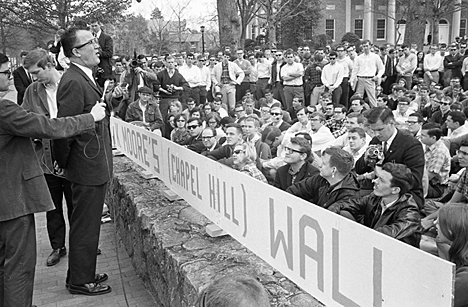Image: NO 3-2-1966 WilkinsonAtCarolina Fr22 (8639149245)
Description: On June 26, 1963, the North Carolina General Assembly passed the Act to Regulate Visiting Speakers, later known as the Speaker Ban Law. The law forbade anyone to speak on a University of North Carolina campus who was a known member of the Communist Party, was known to advocate overthrow of the United States Constitution, or had invoked the Fifth Amendment in respect of communist or "subversive" connections. The law was rushed through in the closing hours of the legislative session with virtually no debate. Governor Terry Sanford was against the Speaker Ban bill, but at that time the governor of North Carolina could not veto legislation. In the wake of the passage of this law, the communities on the UNC campuses rose up in protest. Students, faculty, and community members protested the law and what it represented over the course of the next several years. A number of complex issues involving many key North Carolina political figures and national leaders kept the controversy very active and widely debated through the mid-1960's. In 1965, the North Carolina General Assembly established a commission to look into the consequenses of the law and recommend either ammedment or repeal of the law. The commission held public hearings in August and September of 1965 and in November amended the law absolving the state legislature from having to make rulings on who could speak on campuses and who could not and returning effective control over those issues to the universities. (Speaker Ban Law Study Commission records are held by the State Archives of North Carolina; finding aid is online http://www.archives.ncdcr.gov/findingaids/pdf/sa_speaker_ban_law_study_commission.pdf). In 1966 students at the University of North Carolina at Chapel Hill led by Student Body President Paul Dickson invited Herbert Aptheker and Frank Wilkinson ('known' Communists) to speak on the campus. As expected, the university refused to allow either of the speakers to give their speeches on campus. Instead, they addressed the assembled crowd on March 2, 1966, from across the stone wall that separates the university from the town of Chapel Hill. Ultimately a federal law suit against the university and the State of North Carolina was filed by UNC students. On February 19, 1968, after two years of consideration by the Federal District Court in Greensboro, Dickson, et al. v Sitterson, et al. was decided for the plaintiffs -- the court's opinion found the Speaker Ban law and policy unconstitutional. For more information on the Speaker Ban Law, its complexities, and surrounding events, please see this online exhibit and collection http://www.lib.unc.edu/mss/exhibits/protests/ban.html, NCpedia entry http://ncpedia.org/speaker-ban-law, and http://www.northcarolinahistory.org/commentary/187/entry/, used in the drafting of the above description of this set of images. COPYRIGHTED BY THE RALEIGH NEWS AND OBSERVER NEWSPAPER. DO NOT USE OR PUBLISH WITHOUT EXPRESSED CONSENT FROM THE N&O.
Title: NO 3-2-1966 WilkinsonAtCarolina Fr22 (8639149245)
Credit: https://www.flickr.com/photos/north-carolina-state-archives/8639149245/
Author: State Archives of North Carolina
Permission: At the time of upload, the image license was automatically confirmed using the Flickr API. For more information see Flickr API detail.
Usage Terms: No known copyright restrictions
License: No restrictions
License Link: https://www.flickr.com/commons/usage/
Attribution Required?: No
Image usage
The following page links to this image:


